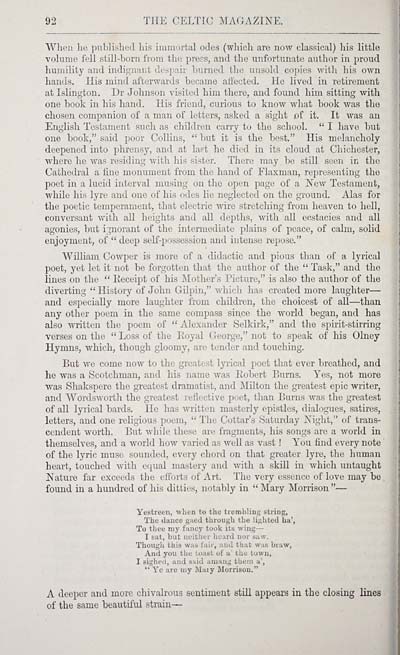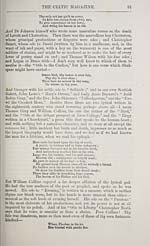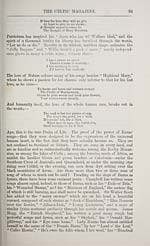Blair Collection > Celtic magazine > Volume 3
(102)
Download files
Complete book:
Individual page:
Thumbnail gallery: Grid view | List view

92 THE CELTIC MAGAZINE.
When he published his immortal odes (which are now classical) his little
volume fell still-born from the press, and the unfortunate author in proud
humility and indignant despair burned the unsold copies with his own
hands. His mind afterwards became ali'ected. He lived in retirement
at Islington. Dr Johnson visited him there, and found him sitting with
one book in his hand. His friend, curious to know what book was the
chosen companion of a man of letters, asked a sight of it. It was an
English Testament such as children carry to the school. " I have but
one book," said poor Collins, " but it is the best." His melancholy
deepened into phrensy, and at la?t he died in its cloud at Chichester,
where he was residing with his sister. There may be still seen in the
Cathedral a fine monument from the hand of Flaxman, representing the
poet in a lucid interval musing on the open page of a New Testament,
while his lyre and one of his odes lie neglected on the ground. Alas for
the poetic temperament, that electric wire stretching from heaven to hell,
conversant with all heights and all depths, with all eostacies and all
agonies, but ignorant of the intermediate plains of peace, of calm, solid
enjoyment, of " deep self-possession and intense repose."
William Cowper is more of a didactic and pious than of a lyrical
poet, yet let it not be forgotten that the author of the " Task," and the
lines on the " Keceipt of his Mother's Picture," is also the author of the
diverting " History of John Gilpin," which has created more laughter —
and especially more laughter from children, the choicest of all — than
any other j)oem in the same compass since the world began, and has
also written the poem of " Alexander Selkirk," and the spirit-stirring
verses on the " Loss of the Eoyal George," not to speak of his Olney
Hymns, which, though gloomy, are tender and touching.
But we come now to the greatest lyrical poet that ever breathed, and
he was a Scotchman, and his name was Robert Burns. Yes, not more
was Shakspere the greatest dramatist, and Milton the greatest epic writer,
and Wordsworth the greatest reflective poet, than Burns was the greatest
of all lyrical bards. He has written masterly epistles, dialogues, satires,
letters, and one religious poem, " The Cottar's Saturday Night," of trans-
cendent worth. But while these are fragments, his songs are a world in
themselves, and a world how varied as well as vast ! You find every note
of the lyric muse sounded, every chord on that greater lyre, the human
heart, touched with equal mastery and with a skill in which untaught
Nature far exceeds the efforts of Art. The very essence of love may be
found in a hundred of his ditties, notably in " Mary Morrison " —
Yestreen, when to the trembling string,
The dance gaed through the lighted ha',
To thee my fiincy took its wing—
I sat, but neither heard nor saw.
Though this was fair, and that was braw,
And you the loast of a' the town,
I sighed, and said arnang them a',
" Ye are my Maiy Morrison."
A deeper and more chivalrous sentiment still appears in the closing lines
of the same beautiful strain —
When he published his immortal odes (which are now classical) his little
volume fell still-born from the press, and the unfortunate author in proud
humility and indignant despair burned the unsold copies with his own
hands. His mind afterwards became ali'ected. He lived in retirement
at Islington. Dr Johnson visited him there, and found him sitting with
one book in his hand. His friend, curious to know what book was the
chosen companion of a man of letters, asked a sight of it. It was an
English Testament such as children carry to the school. " I have but
one book," said poor Collins, " but it is the best." His melancholy
deepened into phrensy, and at la?t he died in its cloud at Chichester,
where he was residing with his sister. There may be still seen in the
Cathedral a fine monument from the hand of Flaxman, representing the
poet in a lucid interval musing on the open page of a New Testament,
while his lyre and one of his odes lie neglected on the ground. Alas for
the poetic temperament, that electric wire stretching from heaven to hell,
conversant with all heights and all depths, with all eostacies and all
agonies, but ignorant of the intermediate plains of peace, of calm, solid
enjoyment, of " deep self-possession and intense repose."
William Cowper is more of a didactic and pious than of a lyrical
poet, yet let it not be forgotten that the author of the " Task," and the
lines on the " Keceipt of his Mother's Picture," is also the author of the
diverting " History of John Gilpin," which has created more laughter —
and especially more laughter from children, the choicest of all — than
any other j)oem in the same compass since the world began, and has
also written the poem of " Alexander Selkirk," and the spirit-stirring
verses on the " Loss of the Eoyal George," not to speak of his Olney
Hymns, which, though gloomy, are tender and touching.
But we come now to the greatest lyrical poet that ever breathed, and
he was a Scotchman, and his name was Robert Burns. Yes, not more
was Shakspere the greatest dramatist, and Milton the greatest epic writer,
and Wordsworth the greatest reflective poet, than Burns was the greatest
of all lyrical bards. He has written masterly epistles, dialogues, satires,
letters, and one religious poem, " The Cottar's Saturday Night," of trans-
cendent worth. But while these are fragments, his songs are a world in
themselves, and a world how varied as well as vast ! You find every note
of the lyric muse sounded, every chord on that greater lyre, the human
heart, touched with equal mastery and with a skill in which untaught
Nature far exceeds the efforts of Art. The very essence of love may be
found in a hundred of his ditties, notably in " Mary Morrison " —
Yestreen, when to the trembling string,
The dance gaed through the lighted ha',
To thee my fiincy took its wing—
I sat, but neither heard nor saw.
Though this was fair, and that was braw,
And you the loast of a' the town,
I sighed, and said arnang them a',
" Ye are my Maiy Morrison."
A deeper and more chivalrous sentiment still appears in the closing lines
of the same beautiful strain —
Set display mode to: Large image | Transcription
Images and transcriptions on this page, including medium image downloads, may be used under the Creative Commons Attribution 4.0 International Licence unless otherwise stated. ![]()
| Early Gaelic Book Collections > Blair Collection > Celtic magazine > Volume 3 > (102) |
|---|
| Permanent URL | https://digital.nls.uk/76444713 |
|---|
| Description | Volume III, 1878. |
|---|---|
| Shelfmark | Blair.4 |
| Attribution and copyright: |
|
| Description | A selection of books from a collection of more than 500 titles, mostly on religious and literary topics. Also includes some material dealing with other Celtic languages and societies. Collection created towards the end of the 19th century by Lady Evelyn Stewart Murray. |
|---|
| Description | Selected items from five 'Special and Named Printed Collections'. Includes books in Gaelic and other Celtic languages, works about the Gaels, their languages, literature, culture and history. |
|---|

